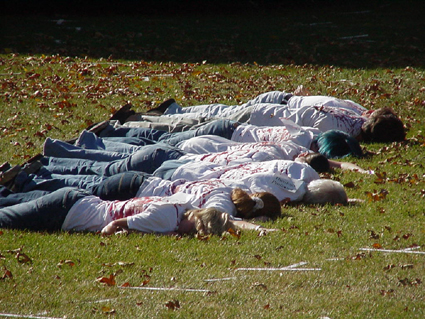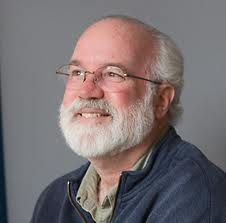Who is a martyr? The question comes to mind 25 years after what has become known as “the Jesuit massacre” in El Salvador.
On November 16, 1989, an elite battalion of the Salvadoran military forced its way into the Jesuit residence at the University of Central America, or UCA, in San Salvador. Most of the soldiers had received counter-insurgency training in Georgia, at the U.S. Army School of the Americas. They proceeded to murder six Jesuits, their housekeeper, and her teenage daughter.
Unlike the martyrs of ancient Christianity, these men were not killed simply because they professed the faith. They were targeted specifically for speaking out on behalf of the impoverished and against persecutions carried out by the U.S.-backed military. Still, in the view of many, they died for the faith no less than the martyrs of old.
This happens to be subject to dispute in some quarters. The argument has surfaced mostly in connection with the sainthood cause of Archbishop Oscar Romero, who was gunned down by a paramilitary death squad while saying mass in the chapel of a cancer hospital in San Salvador, in 1980.
Friends of the cause would like to see Romero declared a martyr, a move that would unblock his path to beatification (the next-to-last step to sainthood) by making it unnecessary to prove that he performed a miracle. In other words, if you’re a martyr, you don’t need to be miraculous, at that critical stage of the process. Your advocates do need to prove just one miracle, though, in the final lap of canonization.
Those less thrilled with this prospect say Romero was not a martyr, because he didn’t die defending Christianity in general or a core doctrine such as the Resurrection. In this right-leaning view, Romero perished because he defended something so ancillary to the faith as the rights of the poor and powerless.
The argument is a little tendentious. It’s a bit like saying Derek Jeter doesn’t deserve a spot in baseball’s Hall of Fame because he didn’t hit all that many grand slammers. All he did was rack up 300-plus batting averages, steal bases like they were gold, and, speaking of which, walk off with five Golden Glove awards. Of course, all of that counts in Major League Baseball, just as standing up for the lowly and dispossessed matters in Christianity. The analogy veers off, because Romero was more than the theological equivalent of a great singles hitter. He knocked the ball out of the park in a way he could have never done by merely self-identifying as a Christian or endorsing the doctrine of transubstantiation.
In essence, Romero’s detractors are arguing that justice and the poor aren’t all that central to revealed faith. So, if you were forced to lay face down on the grass in the courtyard of UCA’s Jesuit residence, before shots were fired into your head, you didn’t have to go through all that trouble on account of your religious convictions. It was a sort of private choice you made, on the basis of your left-of-center political preferences, according to these skeptics.
But what happens if solidarity with the poor and marginalized is no small part of the story told in the Hebrew and Christian Scriptures? What if the so-called “preferential option for the poor,” articulated over the past generation in Catholic social teaching, means something?
I asked a Jesuit about this, specifically in the context of martyrdom. The Rev. Stephen A. Privett, S.J., is no random member of the Society of Jesus. He is the former president of the University of San Francisco, a Jesuit institution, and he knew the UCA Jesuits as a refugee worker in El Salvador during the late 1980s. The six priests were Ignacio Ellacuría (UCA president and internationally renowned theologian), Ignacio Martín-Baró, Segundo Montes, Amando López, Joaquin López y López, and Juan Ramón Moreno. They were slain together with Julia Elba Ramos and her 16-year-old daughter, Celina Maricet Ramos.
Privett and many others refer to all of them simply as “the martyrs.” He explained why, in an article I did for the U.S. Jesuit Conference, on the 25th anniversary of the predawn rampage at UCA. (The full story is available here, and my follow-up piece was also posted yesterday at the Conference’s site, www.jesuit.org.)
“When you sacrifice your life because of your active support for the marginalized, you are a martyr in the traditional sense. You are witnessing to a transcendental reality that is not comprehended by others, particularly the folks who are wielding the power,” explained Privett, underscoring that work for justice is an inherent part of his faith.
“I think the church needs martyrs in every era, to remind us that we can never be comfortable with the world as it is. We have to work for a better world, and often we pay a pretty heavy price, but that price is not that heavy when you look at it through the lens of the Resurrection, or through the eyes of the martyrs,” Privett added, putting a doctrinal and specifically Christian spin on the matter. “It’s a really important part and a dynamic piece of our tradition that keeps us moving and engaged, never comfortable with any status quo this side of heaven.”
For now, Privett and others will have to remain content with this supernatural form of justice. That’s because, in the case of the six Jesuits and two women, human justice was never done. None of the top military commanders who gave the orders to kill was ever prosecuted for the crimes. And we know their names, thanks in part to a 1993 report by a United Nations truth commission that investigated the atrocities.
Human-rights activists, including the San Francisco-based Center for Justice and Accountability, would like to see some long-delayed justice in this matter. So would Spain, which is now claiming jurisdiction in the case because five of the six Jesuit victims were Spaniards. Prosecutors there are trying to extradite some of those named by the U.N. commission. International justice might be catching up with the murderers, as one way of honoring the memory of the martyrs. …read more








